

Copyright 2009 by Dianna Booher. All rights reserved. Except as permitted under the United States Copyright Act of 1976, no part of this publication may be reproduced or distributed in any form or by any means, or stored in a database or retrieval system, without the prior written permission of the publisher.
ISBN: 978-0-07-164139-5
MHID: 0-07-164139-4
The material in this eBook also appears in the print version of this title: ISBN: 978-0-07-148668-2, MHID: 0-07-148668-2.
All trademarks are trademarks of their respective owners. Rather than put a trademark symbol after every occurrence of a trademarked name, we use names in an editorial fashion only, and to the benefit of the trademark owner, with no intention of infringement of the trademark. Where such designations appear in this book, they have been printed with initial caps.
McGraw-Hill eBooks are available at special quantity discounts to use as premiums and sales promotions, or for use in corporate training programs. To contact a representative please e-mail us at bulksales@mcgraw-hill.com.
This publication is designed to provide accurate and authoritative information in regard to the subject matter covered. It is sold with the understanding that the publisher is not engaged in rendering legal, accounting, or other professional service. If legal advice or other expert assistance is required, the services of a competent professional person should be sought.
From a declaration of principles jointly adopted by a committee of the American Bar Association and a committee of publishers.
TERMS OF USE
This is a copyrighted work and The McGraw-Hill Companies, Inc. (McGraw-Hill) and its licensors reserve all rights in and to the work. Use of this work is subject to these terms. Except as permitted under the Copyright Act of 1976 and the right to store and retrieve one copy of the work, you may not decompile, disassemble, reverse engineer, reproduce, modify, create derivative works based upon, transmit, distribute, disseminate, sell, publish or sublicense the work or any part of it without McGraw-Hills prior consent. You may use the work for your own noncommercial and personal use; any other use of the work is strictly prohibited. Your right to use the work may be terminated if you fail to comply with these terms.
THE WORK IS PROVIDED AS IS. McGRAW-HILL AND ITS LICENSORS MAKE NO GUARANTEES OR WARRANTIES AS TO THE ACCURACY, ADEQUACY OR COMPLETENESS OF OR RESULTS TO BE OBTAINED FROM USING THE WORK, INCLUDING ANY INFORMATION THAT CAN BE ACCESSED THROUGH THE WORK VIA HYPERLINK OR OTHERWISE, AND EXPRESSLY DISCLAIM ANY WARRANTY, EXPRESS OR IMPLIED, INCLUDING BUT NOT LIMITED TO IMPLIED WARRANTIES OF MERCHANTABILITY OR FITNESS FOR A PARTICULAR PURPOSE. McGraw-Hill and its licensors do not warrant or guarantee that the functions contained in the work will meet your requirements or that its operation will be uninterrupted or error free. Neither McGraw-Hill nor its licensors shall be liable to you or anyone else for any inaccuracy, error or omission, regardless of cause, in the work or for any damages resulting therefrom. McGraw-Hill has no responsibility for the content of any information accessed through the work. Under no circumstances shall McGraw-Hill and/or its licensors be liable for any indirect, incidental, special, punitive, consequential or similar damages that result from the use of or inability to use the work, even if any of them has been advised of the possibility of such damages. This limitation of liability shall apply to any claim or cause whatsoever whether such claim or cause arises in contract, tort or otherwise.
Contents
Acknowledgments
My thanks to the following people for their help:
 Clients and attendees of writing and grammar workshops for their examples and lively discussions!
Clients and attendees of writing and grammar workshops for their examples and lively discussions!
 The team at McGraw-Hill; Donya Dickerson, my editor; and Doris Michaels, my agent.
The team at McGraw-Hill; Donya Dickerson, my editor; and Doris Michaels, my agent.
 Polly Fuhrman, for reading the manuscript and offering comments.
Polly Fuhrman, for reading the manuscript and offering comments.
 Kari Gates, for reading the manuscript, offering comments, and helping to prepare the manuscript.
Kari Gates, for reading the manuscript, offering comments, and helping to prepare the manuscript.
 The Booher team for picking up the slack in my absence from the office while I wrote yet another book!
The Booher team for picking up the slack in my absence from the office while I wrote yet another book!
DIANNA BOOHER
Introduction
NO LOUDING
While visiting a museum in Beijing, I saw a sign that read NO LOUDING. After a chuckle at what was obviously intended to mean No Yelling in this dignified place of artifacts and learning, I thought to myself: even if English is a second language here, youd think that the curator would have verified the translation before posting signs everywhere.
But on later reflection, Ive come to believe that people dont ask about things they dont know they dont know. That is, professionals today in every country and in every walk of lifeprofessors, plumbers, engineers, accountants, salespeople, systems analysts, CEOs, and surveyorsmake many of the same mistakes when they write and speak.
Some very smart people have difficulty with grammar. The peculiar thing is that they think other people dont notice! Imagine.
Thats like an amateur carpenter saying to a master builder, Im making my granddaughter a desk chair for her dorm. One leg is an inch shorter than the other three. But I dont think thatll be noticeable, do you? Thats like a shipper saying to the accountant, Our invoices dont agree with the bank statements, but I dont think that should create any questions. Or how far do you think a lawyer could get in court by inserting all the wrong dates in his clients sworn testimony and appeals?
We notice errors and imprecision in our own area of expertiseyet we think accuracy and precision in language dont matter. But they do.
For starters, grammar errors create clarity problems. Consider this sentence: The 90-day clause in the contract, which is still pending approval, does not allow a price increase. If the contract is still pending approval, finethats what the sentence says. But if its the 90-day clause thats pending approval, this is a problem waiting to happen. If the 90-day clause is pending approval, the sentence should read, The contracts 90-day clause, which is still pending approval, does not allow a price increase.
A second reason to be concerned: coworkers and customers may not be amused by mistakes. In fact, they may become downright annoyed. Airline executives have discovered that dirty meal trays indicate to passengers that the mechanics dont service the engines. Similarly, poor grammar on the part of bank tellers suggests to customers that their home mortgages contain amortization errors. Perception overpowers logic in such cases.
Image counts.
To the listening ear of a client or a boss, bad grammar sounds like fingernails dragging across a chalkboard.
Yet bad grammar is like bad breatheven your best friends wont tell you. Besides, its bad manners to go around embarrassing other people by pointing out their errors. After all, I dont want you to come over to my house and point out the cobwebs in the corners. So lets just do this little self-improvement project anonymously. (You can send a maid to my house any time by arrangement, thank you very much.)
Next page

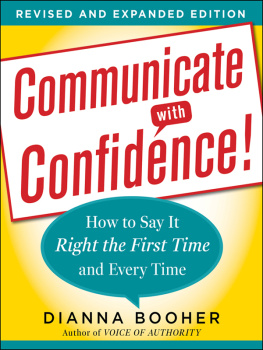
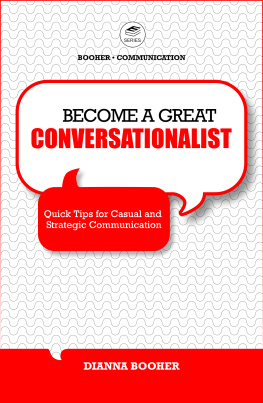

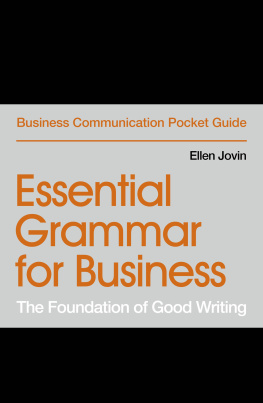

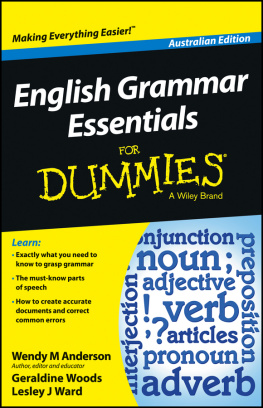
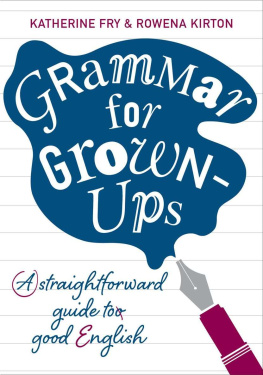



 Clients and attendees of writing and grammar workshops for their examples and lively discussions!
Clients and attendees of writing and grammar workshops for their examples and lively discussions!